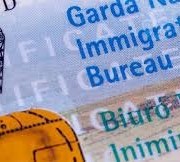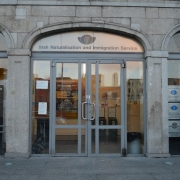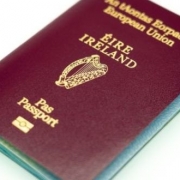The Supreme Court have delivered a seminal judgement in the case of MK(Albania) v Minister for Justice v Minister for Justice and Equality [2022] IESC 0000.
The Supreme Court have issued five separate judgements in respect of this case.
The majority of the Supreme Court, including the Chief Justice ruled not to overturn the judgement of the High Court. The High court had determined in this case that a person “with a non-settled or precarious residential status cannot assert Article 8 rights, unless exceptional circumstances arise. Accordingly, a proportionality assessment does not arise”.
There are two dissenting judgements of Ms Justice Baker and Mr Justice Mac Menamin who ruled that they would have quashed the decision under challenge.
The case involved a young person from Albania who came to Ireland as a minor at the age of 16. An application for international protection in the State was submitted on his behalf. His applications for refugee status and subsidiary protection were refused. His application for leave to remain in the State was then considered and ultimately refused. The Applicant was thereafter issued with a deportation order requiring him to leave the State and remain outside the State indefinitely. The Applicant has lived in Ireland for six years, has went to school here, reached the age of majority here and lived in foster care in this State.
The decision to refuse him leave to remain in Ireland and to issue him with a deportation order found that given the precarious nature of his residence in Ireland, as a failed asylum seeker, Article 8 of the European Convention on Human rights was not engaged in his case.
The Supreme Court Justices all held that this was not in fact correct. The Court found that Article 8 ECHR was in fact engaged in the case, however the majority judgement held that in any event if the decision maker had correctly assessed the case in substance. The Court found that it would only be in the most exceptional of cases, with wholly exceptional circumstances, that an infringement of an applicant’s private life rights would outweigh a State’s legitimate aim of protecting the integrity of the immigration system.
Chief Justice O’Donnell in his Judgement outlined the key question at issue in this case:
how should the question of the impact upon the applicant’s private life of a decision of a refusal of leave to remain and/or removal from Ireland be approached and analysed under Article 8?
It is accepted in the Supreme Court judgements that the decision made by the Minister in this case followed the legal tests as outlined a case from the United Kingdom, R (Razgar) v. Secretary of State for the Home Department [2004] UK HL 27, [2004] 2 AC 368 as adopted in this State by the Court of Appeal case of C.I. & Ors. v. The Minister for Justice, Equality & Law Reform [2015] IECA 192, [2015] 3 I.R. 385.
Mr Justice O’Donnell confirmed that this was not the correct approach in these cases. The approach in those cases would appear to be that exceptional circumstances need to arise before Article 8 is engaged. The Supreme Court found this to be incorrect, it should have been held that Article 8 is engaged (even if the applicant’s permission is “precarious”) and the decision maker should then have assessed whether the interference with the rights was proportionate to the legitimate aim being pursued. There is no question of the rights protected by Article 8 being breached in this case – the only thing in issue is the manner in which that conclusion should have been reached.
The Court did state that in cases of “settled migrants” whose permission in the State could not be deemed precarious, there may be more possibility that an applicant’s Article 8 rights might more readily outweighed by the legitimate interests of the State.
Mr Justice O’Donnell held:
The point has been reached where I think it should be recognised that it is in the nature of any decision which refuses leave to remain in the country and renders future residence unlawful and perhaps, even more clearly, where the decision is one for forced removal, that such a decision is normally likely to have an impact of such gravity on an individual who has been living lawfully in Ireland for any appreciable time to engage the operation of Article 8. This is so even if that residence is precarious on the basis of a permission that is necessarily temporary and limited and where the decision to refuse leave to remain, or indeed to deport, is no more than the enforcement and application of the limitation of that permission or its termination in accordance with its terms. To that extent, I agree that the applicant’s analysis is correct and, accepting for the moment the Razgar test as a template for the Minister’s decision in this case, the applicant’s case ought to have been assessed under the fifth limb of the test, that is, whether such interference was proportionate to the legitimate public ends sought to be achieved.
The Court held clarified that that while accepting the decision is invalid, I would refrain from ordering certiorari, on the grounds that the outcome would inevitably be the same. Instead for the reasons I have tried to set out, I do not consider that the decision of the Minister was invalid.
The Court held that there was no obligation on decision makers to assess applications in a particular format and what was important is that rights are “respected and not breached” and in compliance with The European Convention on Human Rights Act, 2003.
In Mr Justice Hogan’s judgement the Court addresses the query as to whether the applicant could invoke Constitutional rights in these proceedings, namely Article 40.3 privacy and Article 40.6 associational rights:
It follows, therefore, that, based on the NHV analysis, non-nationals enjoy the protections afforded by Article 40.3 and Article 40.6.1.iii (and the other relevant constitutional provisions) in respect of these privacy and associational rights. To that extent, therefore, non-nationals enjoy (in principle, at any rate) a combination of privacy, associational and autonomy-style constitutional rights which correspond to the omnibus description of the right to a private life contained in Article 8 ECHR.
The other judgements outline this case was not the appropriate case to consider Constitutional rights as they interact with Article ECHR rights.
Ms Justice O’Malley agrees with the majority judgment in her judgement.
Mr Justice Mac Menamin in his dissenting judgment respectfully disagrees with the majority and finds that the question of methodology cannot be separated from the substance of the decision.
In concluding that he would quash the Minister’s decision Mr Justice Mac Menamin held the decision-making process in this case led to a test which commenced by asking whether Article 8 is engaged, which was answered by considering the gravity of the consequences, rather than whether the privacy and family right actually arose for consideration on the facts.
Mr Justice Mac Menamin concludes:
There is, at the heart of this appeal, a fundamental question of legal principle concerning rights and remedies. I respectfully, therefore, dissent from the judgment of the majority as to the absence of any remedy. In the first instance, I would have granted the appellant an order of certiorari of the Minister’s orders in this case. But, failing that, I would, alternatively, have granted a declaration that, by virtue of the respondent’s breach of his rights under Articles 8 and 13 of the ECHR, the appellant was entitled to a declaration that the respondent had breached her statutory duty under s.3(1() of the 2003 Act. In my view, such a conclusion must follow from the application of the soundest of all legal principles, that is the protection of the rule of law
In her dissenting judgement. Ms Justice Baker concurs with Mr Justice Mac Menamin and finds:
“Mac Menamin J. notes, that there are few cases where the interests of a precarious unsettled migrant with a personal family or private life could outweigh the significant interests of the State.”
Ms Justice Baker holds that the decision refusing the applicant leave to remain should have been quashed and re assessed by the Minister on the basis that:
“That the process be correct, and be seen to have been correctly applied, is not a mere formality…
…
…the essence of administrative law is to ensure that the process followed by an administrative decision maker were correct, not because due process is an end in itself, 4 but because a person who invokes a process is entitled to understand that process, to know that it was properly applied, and as a result to be in a position to know that the decision maker acted lawfully.”
This important Judgement will undoubtedly have an impact on how applications for leave to remain are to be considered by the Minister in Ireland from now on. It can no longer be the case that an applicant needs to show exceptional circumstances prior to being entitled to a proportionality assessment of any infringement of their private and family life rights under Article 8 ECHR.
This blog article has been prepared on the basis of current immigration law and policy, which is subject to change. Please keep an eye on our blog and Facebook page where articles relating to updates and changes in immigration law and policy are regularly posted.








